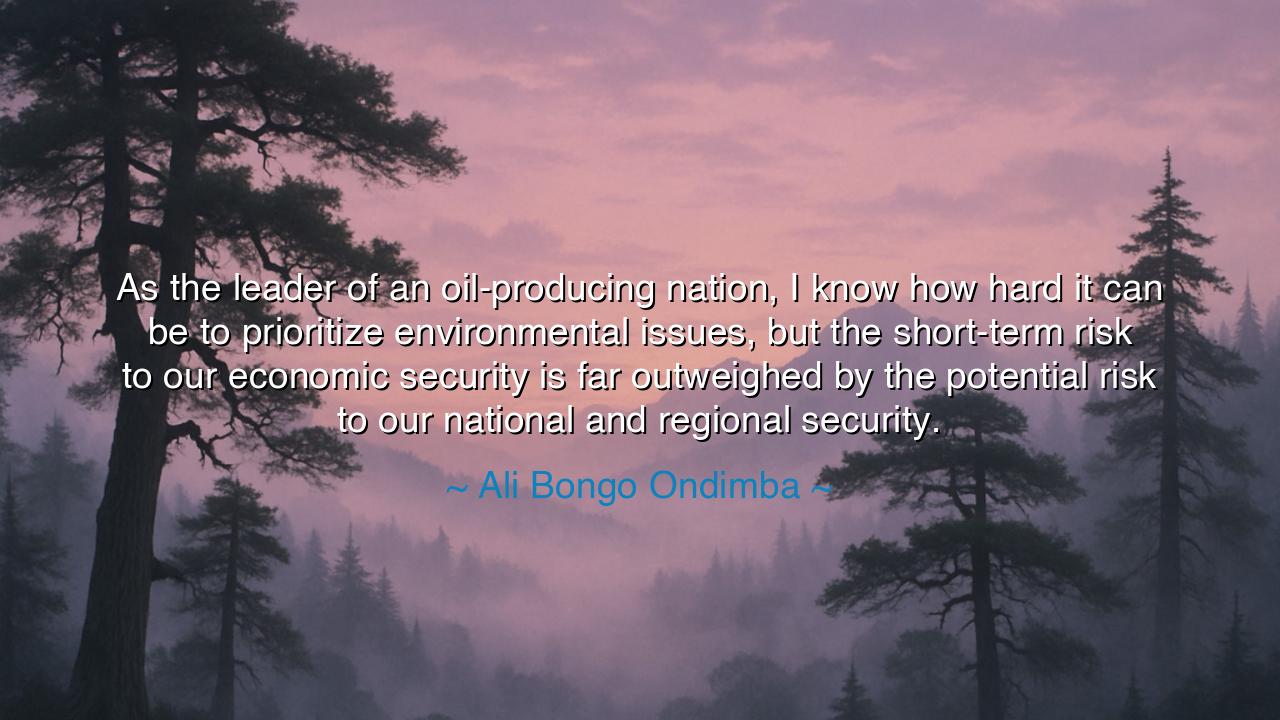
As the leader of an oil-producing nation, I know how hard it can
As the leader of an oil-producing nation, I know how hard it can be to prioritize environmental issues, but the short-term risk to our economic security is far outweighed by the potential risk to our national and regional security.






Hear the solemn declaration of Ali Bongo Ondimba: “As the leader of an oil-producing nation, I know how hard it can be to prioritize environmental issues, but the short-term risk to our economic security is far outweighed by the potential risk to our national and regional security.” These words are not spoken from the safety of theory, but from the furnace of reality, where the treasures of the earth both enrich and endanger those who rely upon them. It is the voice of a ruler who sees beyond the glitter of oil and perceives the shadows it casts upon the future.
The meaning of this quote rests upon the struggle of nations that depend upon oil wealth. For decades, oil has been the lifeblood of economies, fueling prosperity, jobs, and influence. Yet it also binds a people to a dangerous path, one where fluctuations in markets, global demands, and environmental devastation can topple security itself. Ondimba acknowledges the tension: to invest in the environment may seem, in the short term, to weaken economic strength. But to ignore it is to gamble with the very survival of the nation. For when ecosystems collapse, when climate brings famine, when instability spreads, no wealth of oil can buy back peace.
History bears witness to this truth. Consider the Dust Bowl of the 1930s in the United States. Farmers, driven by the desire for profit, ignored the balance of nature, stripping the land of its protective grasses. At first, it brought abundance. But when the winds rose, the soil itself was carried away, plunging millions into poverty and displacing entire communities. Economic strength crumbled into dust because environmental stewardship had been forgotten. Ondimba’s words echo this warning: neglecting the environment brings not only ecological ruin but also social and security collapse.
We see also the example of Nigeria, another oil-rich nation. Decades of dependence upon oil revenues brought corruption and short-term gains, but neglect of the Niger Delta’s environment left poisoned rivers, devastated communities, and unrest. What was once a blessing became a curse, sparking insurgencies and violence. Here, the truth is laid bare: national security cannot stand upon poisoned soil and polluted waters. Prosperity without stewardship becomes instability.
Ondimba’s wisdom lies in his courage to admit what many leaders fear to say: that the environment is not separate from security, but its very foundation. A nation that ignores rising seas, shifting rains, and dying forests may find its armies strong, its coffers full, and yet its people suffering. True security is not merely the strength of weapons or the wealth of oil, but the resilience of land, water, and climate upon which every human life depends.
The lesson for us is clear: weigh not your decisions by the coin of the present moment, but by the safety of generations yet unborn. It is tempting to grasp short-term gains, to harvest without care, to burn without restraint. But every choice that ignores the earth plants the seeds of conflict, famine, migration, and war. In truth, environmental issues are not luxuries for the rich, but necessities for the survival of all.
Practical action is within reach. Support leaders who look beyond immediate profit and invest in sustainable paths. As individuals, live with moderation: conserve energy, choose wisely what you consume, and lend your voice to the cry for stewardship. Demand that industries, whether in oil, agriculture, or trade, act with foresight rather than greed. For every act of preservation strengthens the pillars of national and regional security.
Thus let Ondimba’s words be remembered: the true wealth of a nation is not in its oil, but in its balance with the earth. The mightiest economy will falter if the soil turns barren and the waters run dry. But the nation that dares to sacrifice short-term gain for long-term survival will stand firm like a tree whose roots drink deeply from the earth. And such a nation will not only endure, but it will safeguard peace for all who dwell within its borders.






AAdministratorAdministrator
Welcome, honored guests. Please leave a comment, we will respond soon